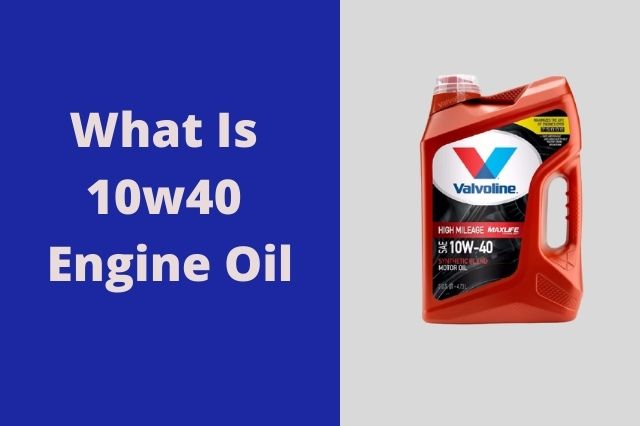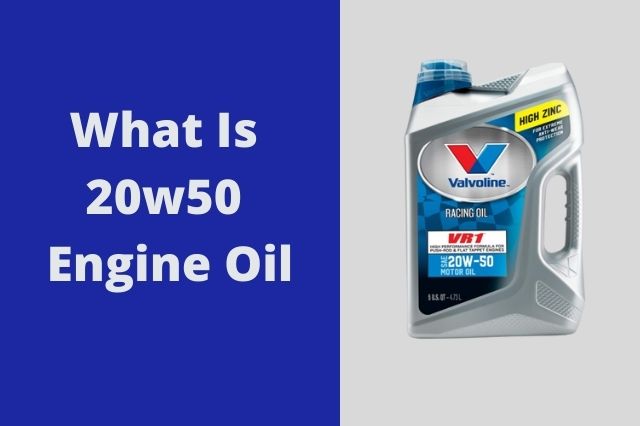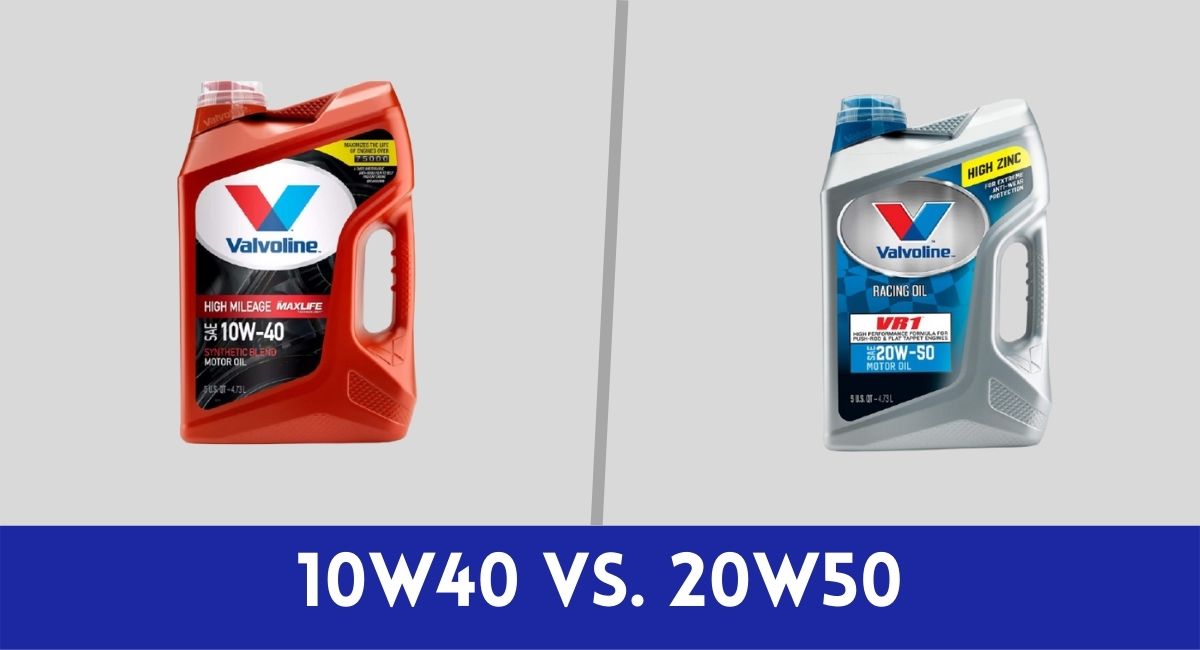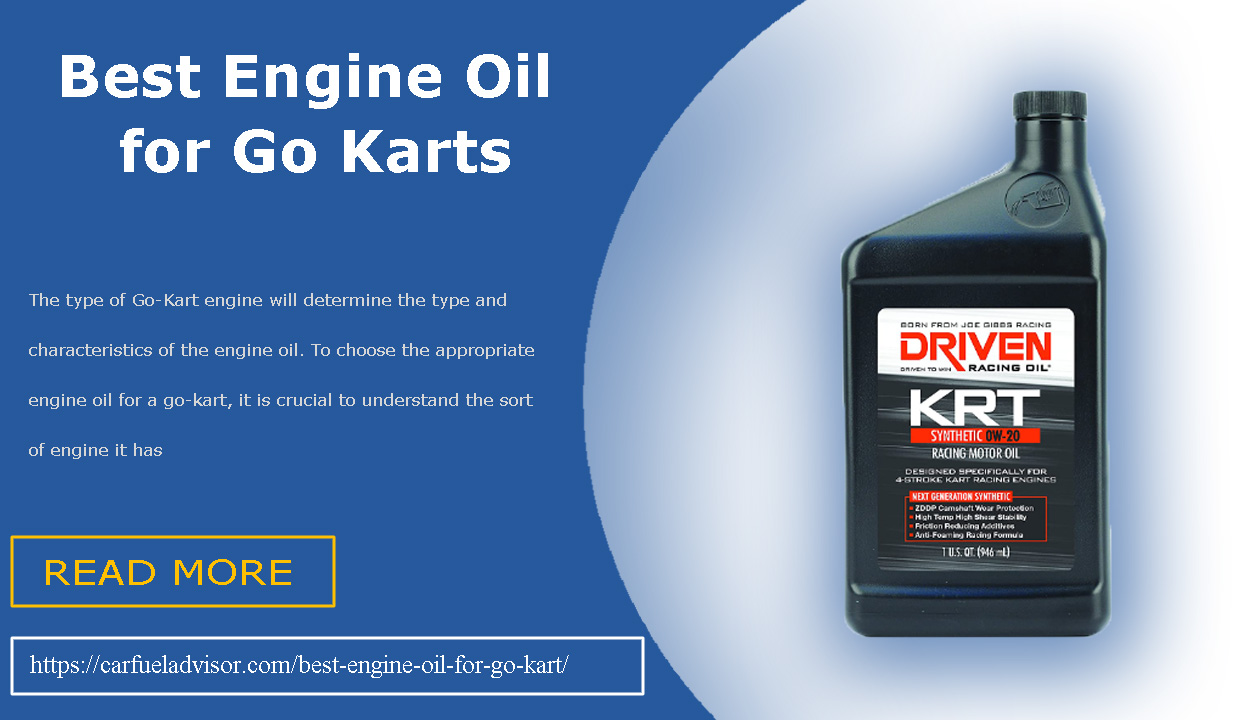Vehicle engines are not designed to work only with one type of oil. Manufacturers mix and match different oils for different engine types, temperature ranges, gasoline octanes, etc to ensure the best lubrication for their engine.
Different types of oil are available in the market depending on their functionality. Among the different options of oil, the two most popular oil types are 10w40 and 20w50 oil.
What is 10w40 Engine Oil and What Engines Can It Be Used For?

10w40 is one of the popular engine oils most recommended for modern-day engines or vehicles. 10w40 is considered a suitable pick for fast vehicles in a cold climate. Also, 10w40 oil is recommended for engines that have passed the 100000 km or 60000 miles to better lubricate the engine.
10w40 oil offers better flow to engine components and protects the piston skirts and bearings when generating heat. So if you have a high-performance engine and modern vehicle that requires extreme lubrication and protection, 10w40 is a perfect pick.
What is 20w50 Engine Oil and What Engines Can It Be Used For?

20w50 is manufacturer-specified engine oil. This means that you should only use the oil when recommended by the manufacturer’s manual. Having a kinematic viscosity of 16.3-21.8 mm2/s, 20w50 oil is primarily ideal for the summer or mild winter season. Moreover, 20w50 gives the ideal lubrication to get a cold pumping in the engine proficiently.
20w50 is also a great opinion to cope up with a long-time high-speed engine situation. The heat generated for a long time driving may cause serious tears and wear if the engine components do not receive sufficient lubrication.
If your car is a pick-up truck or highway fleet, you need to change your vehicle oil more often. 20w50 oil is the best option for you in such cases as it is the best budget option for heavy and oil vehicles. It provides the vehicles with long life and proper lubrication.
When to Use 10w40 and when to Use 20w50 Motor Oil?
If your vehicle is on the newer side, then the recommendation is that you should stick with the 10w40 motor oil. Although 10w40 is a bit expensive, it offers good protection attributes. Also, it is an ideal pick for vehicles operating in cold weather. Moreover, if your vehicle is a modern pick with a high-performance engine that demands extreme protection and lubrication, 10w40 is an ideal pick.
Use 20w50 motor oil only if your vehicle manufacturer recommends it. 20w50 is ideal for both summer and winter climates. If the average running time of your vehicle is high, then you need an engine oil heat that is less expensive for frequent replacement.
Try to follow the rule of thumb and that is if the recommended motor oil for your vehicle is 10w40 motor oil then you can use it but if your vehicle is recommended with a 20w50 motor oil then you can use it too.
10w40 vs 20w50 Engine Oil Differences
Some of the important differences between 10w40 and 20w50 oil are as follow:
Viscosity
In terms of viscosity, the 10w40 motor oil means it has ten as weight and forty as a viscosity grade. In the 20w50 motor oil, it means 20 for weight and 50 for viscosity grade. The 20th viscosity grade (i.e 20w50) is specifically designed for high temperatures situations, while the 40th viscosity grade (i.e 10w40) is specifically designed for cold-temperature situations.
Density
In terms of density, the 20w50 is much denser than the 10w40 motor oil. 10w40 motor oil has a lower density of 865 kg/m3 than the denser 20w50 at 872 kg/m3. As for the mileage, there will be no increased mileage by using either 10w40 or 20w50.
Additives
For good thermal stability and oxidation, both 10w40 and 20w50 are produced from high-quality base oil blended with additives to meet their unique characteristics.
Fuel Economy
10w40 offers better fuel economy than 20w50. 10w40 is ideal for keeping the oil pressure intact while with 20w50 the oil pressure tends to drop because of the increase of thickness in the oil.
Both the motor oil offers the same mileage and the performance of the engine doesn’t significantly change while changing from one to another.
Price
10w40 is a bit expensive engine oil but it has good protection attributes in comparison to 20w50.
If your car is a highway fleet that needs regular oil replacement 20w50 is much preferred as an ideal budgeted oil. However, for the least frequent change of oils in vehicles such as vans or passenger cars, 10w40 is an ideal choice.
Hot Weather
The motor oil will behave differently in hot weather if the temperature is cold rather than high temperature. At low temperatures, the motor oil will thicken resulting in improper lubrication. Therefore the 20w50 viscosity is made for high-temperature situations and the 10w40 is for cold temperature situations.
10w40 vs 20w50 Engine Oil: Which One Is Best for Your Vehicle?
The answer is that it depends. For a high-temperature-based engine 20w50, motor oil will work better than 10w40 whereas the opposite happens in cold-temperature-based situations. The best way to choose the best motor oil for your vehicle is always to follow what your manufacturer recommends. Guessing will not help you or your engine, so you should ask or consult with an expert.
Below is a brief discussion about the different factors of the two motor oil that can help you choose the best for your vehicle
| Factors | 10w40 | 20w50 |
| Viscosity Index(Higher the viscosity index, the better the oil output.) | 150 | 130 |
| Fuel Economy | Better than 20w50 | Less than 10w40 |
| Weather | Preferred Cold Regions | Preferred Warm Regions |
| Price | Bit Expensive | Bit Cheaper |
| Density (Too thick oil tends to drop oil pressure) | Lower | Higher |
| Mileage | Recommended for high mileage vehicles | Recommended in racing engines, not on high mileage engines. |
FAQ
Is 10w40 thicker than 20w50
The higher the viscosity number the better the thickness. It’s clear that 20w50 bears a viscosity of 50 while 10w40 has 40. So, 20w50 is thicker than 10w40.
Why use 20w50?
20w50 is a budget-friendly motor oil that can be used for vehicles that are always in a continuous running state. Besides, 20w50 can be used by engines in both summer and winter weather. Moreover, 20w50 gives the ideal lubrication to get a cold pumping in the engine proficiently.
Is 20w50 good for high mileage?
A 20w50 engine is not recommended to be used for high mileage vehicles. The viscosity level of the 20w50 motor oil is leaning towards racing engines and not on high mileage engines. High mileage engines run hot and it needs a heavy and loaded operation. Thus making 20w50 motor oil is not an ideal option for high mileage.
Is 10w50 good for high mileage?
A 10w50 engine is recommended to be used for high mileage vehicles. The 10w40 motor oil is more vicious and thicker and thicker oils will help older engines to handle high temperatures and even manage to avoid damage. With thicker motor oil, wear and tear are reduced providing an extension to the life of your engine.
Can I use 20w50 instead of 10w40?
The rule of thumb is that it depends on your vehicle. The motor oil that you should be using will depend on your vehicle, the season of your vehicle, and many other factors. Using a 20w50 motor oil for your engine requiring a 10w40 can cause damage, especially for an extended period.
Some mechanics would recommend using 10w40 or 20w50 regardless of what vehicle you are currently driving. But the best choice is to read your owner’s manual and follow what is recommended by your manufacturer.
Final verdict
Each oil has its own unique functionalities and specifications. It is important to choose the right type of oil for your vehicle engine to help it run smoother and avoid engine failures.
Always read through your manufacturer’s manual to see the ideal oil types for your car, such as regular oils or synthetic oils. If 10w40 and 20w50 are compatible with your car, consider the differences and similarities to choose the best one among the two oils.





Oil pressure drops with higher viscosity??? dont think so
Yes, it does.